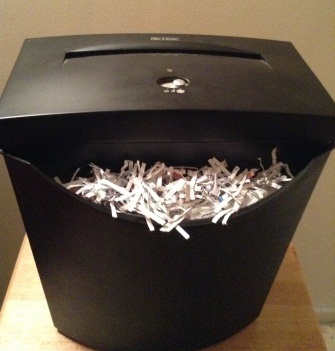Trash or Shred?
 Locking your computer when you walk away, making sure no one is looking over your shoulder when you are typing passwords, and not sharing your passwords with anyone are all ways to protect your digital information. But what about sensitive information that has been printed? Physical documents and files can be a source for identity theft.
Locking your computer when you walk away, making sure no one is looking over your shoulder when you are typing passwords, and not sharing your passwords with anyone are all ways to protect your digital information. But what about sensitive information that has been printed? Physical documents and files can be a source for identity theft.
There are some files that contain confidential and sensitive information that is needed to perform your job. If these files are still needed, make sure they are locked away when they are not being used. When they are no longer needed, do not just throw them in the trash, shred them. Look around your office or building for the nearest shredder. Elon periodically offers shredding days for Elon faculty and staff.
What should be shredded?
- Tax returns older than 4 years
Take a look at one of your old tax returns. What personal information do you see? They contain social security numbers and a wealth of other personal information. Those less than 4 years should be kept in case there is an IRS audit. Keep them in a safe and secure location.
- Bank, credit card, and debit card statements
If you have not switched to paperless billing, you probably receive regular statements in the mail. Those statements include account information such as the account’s balance.
- Old pay stubs
If you do not use direct deposit and still receive paper pay stubs they contain information you do not want others to see so shred them.
- Junk mail
Junk mail is probably the most overlooked of all paper documents. Those pre-approved credit card offers give identity thieves a way to accept the offer on your behalf if you trash them instead of shredding them.
- Any documents that contain passwords or PINs
What kind of shredder should be used?
If you do not have access to a commercial shredder, I recommend investing in a cross cut shredder. It cuts the paper both horizontally and vertically which provides more security than strip cut shredders. Paper shredded using a strip cut shredder can easily be put back together like a puzzle. Cross cut shredders are also known as confetti cut, diamond cut, and micro cut.
Always be mindful about what you are placing in the trash. If you are not sure if something should be trashed or shredded why take a chance? Shred it.
 Follow
Follow